Barely over two years ago, the Den of Geek staff was mere days away from heading to Austin when the inevitable happened: SXSW and all its strange and glorious intersections of film, music, technology, games, and more was canceled due to the then only dawning COVID-19 pandemic. A virtual alternative eventually went forward some months later, and there was a virtual SXSW in 2021 as well, but to concede things haven’t been the same in Austin is an understatement.
Which is perhaps why nearly every face, and every person we spoke with, over the last several weeks in the Texas state capital seemed to have an incorrigible grin on their face. Be they fans or filmmakers, actors or music artists, or even just folks walking down the street, the thrill and good vibes was everywhere. SXSW is back where it once belonged.
During that time, we were able to get a look at some of the most interesting and bizarre films of the year, and preview some of the biggest television events of the season. Below we’ve lined up this handy dandy guide of everything we saw and enjoyed (and maybe a few we didn’t). SXSW, welcome back.
MOVIES
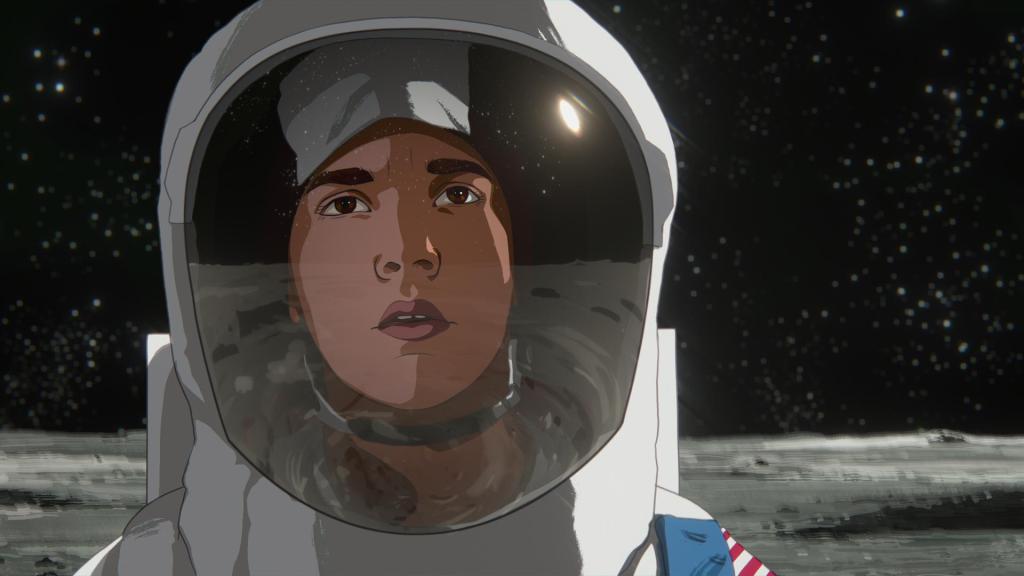
Apollo 10 1/2
For longtime fans of the Boyhood and Before Sunrise director, Apollo 10 1/2 is also something of a stylistic homecoming; the film marks the first time in over 15 years the writer-director has dabbled in rotoscope animation since he popularized the art-form among indie enthusiasts via Waking Life (2001) and A Scanner Darkly (2006). Returning triumphantly here to the aesthetic of animating artwork on top of actual live-action photography and actors, the filmmaker finds new texture to the style by using it to accentuate the slipperiness of a child’s memories—and as a storytelling device that is meant to be as accessible for audiences who enjoyed School of Rock as it is for those keyed into Slacker.
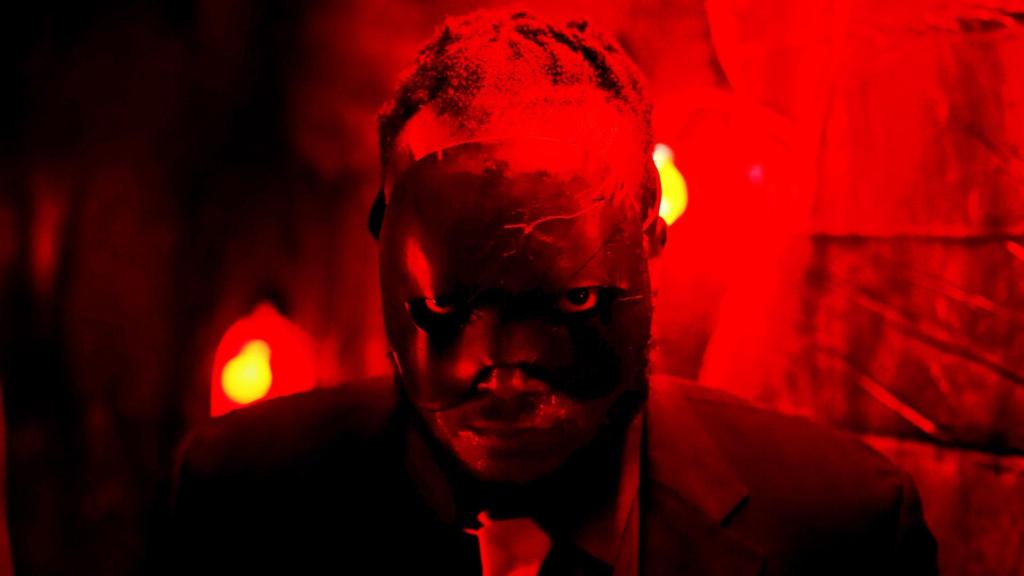
Bitch Ass
A happy nostalgia trip for an era of horror that too often goes ignored, Bitch Ass is a movie made unapologetically in the image of ‘80s and ‘90s Black cinema chillers, or “hood horror,” complete with a Crypt Keeper-like intro by Tony Todd. Yes, Candyman himself happily greets us from a tomb of VHS tapes, which contextualizes Bitch Ass as a movie in the tradition of Candyman (of course), as well as Tales from the Hood, The People Under the Stairs, and more.
Whether the movie is quite as amusing as those and its pleasant table setting is another matter. Director Bill Posley shows some promise in stylish flourishes throughout the film, such as lettered fonts in every room of the house at the center of the movie. It’s there that the guy remembered as Bitch Ass (Tunde Laleye) by his neighborhood was raised by his overbearing and severe grandmother. That was some time ago though, and when a group of gang initiates are tasked with breaking into Bitch Ass’ house, they discover the sad loner everyone remembers from high school has remade himself into a Jigsaw-adjacent tormenter who methodically captures and coerces each kid into playing a murderous variation on a childhood boardgame he grew up loving.
As perhaps indicated by the premise, Bitch Ass has set a repetitive board for its own larger game, and one which is utterly lacking in tension. Nevertheless, Laleye makes an effective screen presence as the game maestro and as Johnathan Colomb and Posley’s wisely short screenplay unwinds, the film’s perfunctory nature and disposable roster of victims eventually gives way to a multigenerational origin story that greatly benefits interest in the film’s central serial killer if not his current story. There is definitely room for this to be an ongoing saga somewhere in the streaming world, but the character has a long way to go if he wants to share shelf space next to the likes of Candyman or Blacula in that Blockbuster store in the sky.
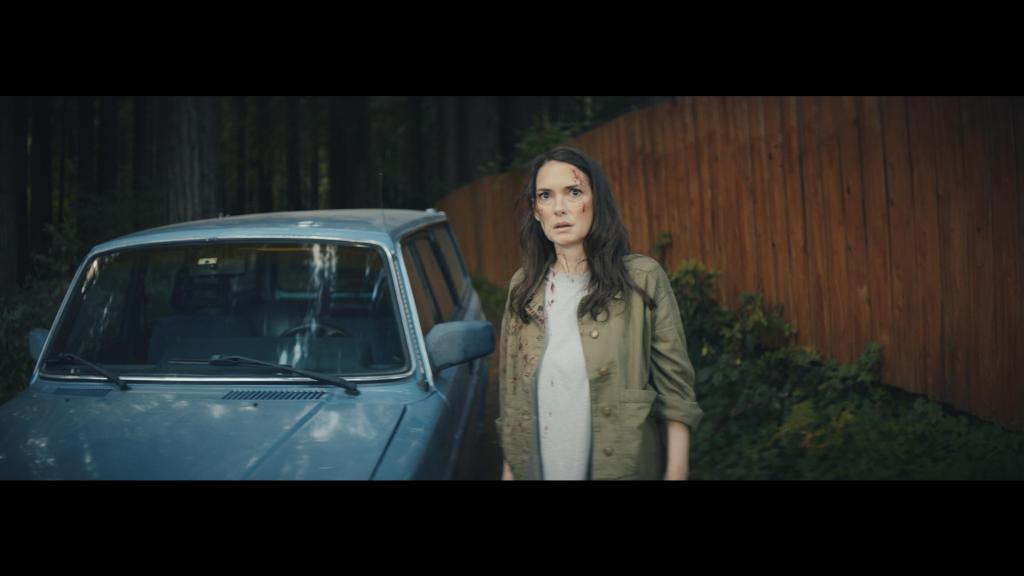
The Cow
Winona Ryder will always be the voice of rebellion and rejected conformity to her earliest fans. The Veronica who had no qualms about blowing off (if not blowing up) all her high school’s Heathers, and the Lydia who boasted, “I myself am strange and unusual.” So casting her as a woman of a certain age who rather enjoys her midlife ennui is a smart move by director Eli Horowitz in The Cow. Genuinely, there are few other actresses who can so gamely deliver the line, “All I want is silence for fucking ever. Is that not allowed?”
And when considering that side of a protagonist who indifferently admits she is dating her younger boyfriend Max (John Gallagher Jr.) to kill time, The Cow works on its own terms. But as being a piece of a larger puzzle box mystery in which Ryder’s Kath slouches more than stumbles into an enigmatic conspiracy, it leaves something to be desired. As a first time writer-director, Horowitz shows an appreciation for knotty plotting and nonlinear storytelling, but the MacGuffin at the center of the film—what really happened to Max after he apparently ghosted Kath on a weekend away to run off with a stranger they just met—is no more enticing than the eventual revelation.
A game cast, which also includes Brianne Tau, Owen Teague, and Dermot Mulroney, go through the paces, and the third act surprise is welcomely out of leftfield, but like Ryder’s screen presence, it could have stayed home and been more fulfilling.
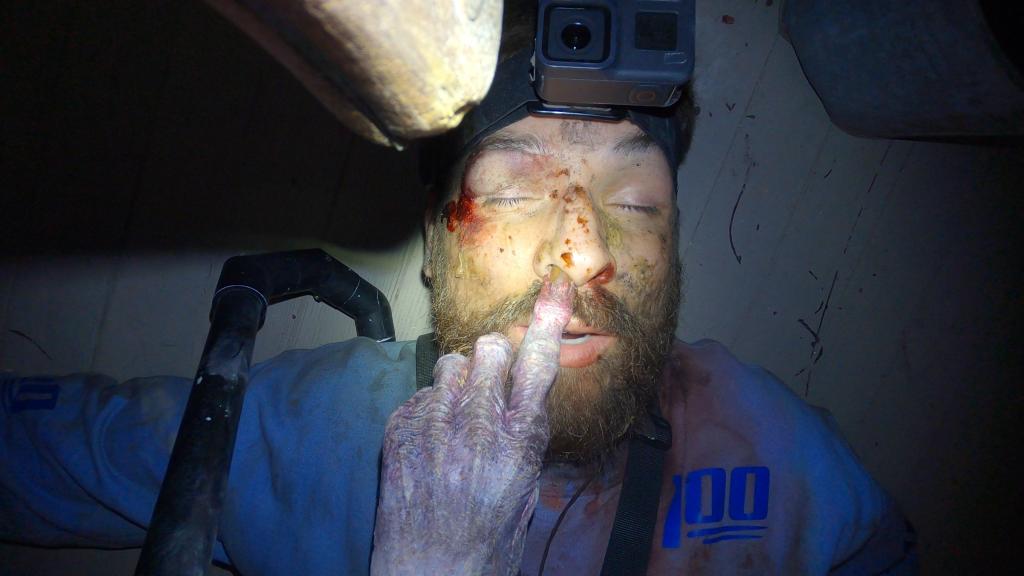
Deadstream
Already the myth about this alleged “Evil Dead II for the live-streaming generation” is growing. And for good reason: It’s a bit like Evil Dead II if restrained by the budgets and technology of the live-streaming age. It’s also a demented blast. To posit it another (and less tweeted) way, this gonzo horror-comedy is a feature length version of that Gene Wilder bit in Young Frankenstein where he says, “Whatever you hear, no matter how cruelly I beg you, do not open this door,” except instead of a charming mad scientist, the Wilder character is now an insufferable YouTuber made in the Logan Paul/Pewdeepie mold. Why yes, yes I would like to see a dead witch shove his face into a putrid bathtub. Thank you for asking!
For a little more context, the film stars one of its co-writers and directors, Joseph Winter (who worked alongside Vanessa Winter). He plays Shawn Ruddy, an obnoxious internet celebrity who’s on thin ice with his sponsors after being canceled for some heinous act we don’t immediately know. Hence he promises they can cut him off forever if he fails his latest twitchy stunt: spending the night in a haunted house (almost) alone. That sounds all well and good until he actually summons the cursed spirit of a woman who hanged herself in the house, as well as all the other undead denizens in the place, and they come clamoring for his soul, but not before poking, prodding, biting, and humiliating him in every way conceivable.
An exercise in how willing audiences are to watch a movie where they dislike the protagonist, Deadstream follows the old Sam Raimi logic of letting you take as much pleasure in his pain as fearing for his safety. The third act also reaches for the gonzo depravity of Raimi’s earliest movies (if not necessarily his technical brilliance). The fact it’s already been snapped up by Shudder feels like kismet, as this appears destined for late night streaming service chuckles.
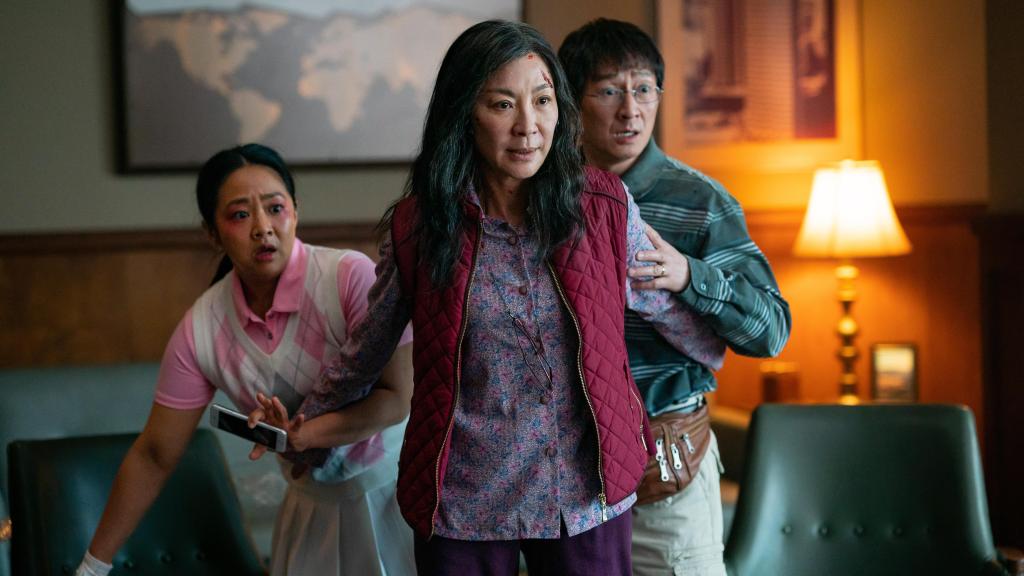
Everything Everywhere All at Once
While the daily indignities of existence are at the heart of Everything Everywhere, they’re also a springboard—a thematic DeLorean to cling to as the movie slowly, but confidently, unfurls the vastness of its science fiction vision. The result is one of the most wildly creative and ambitious genre movies to hit cinemas in some years, revealing that even within the drudgery of a laundromat or an IRS office, the secrets of the multiverse are hidden in plain sight. And when they’re unlocked, what’s released is nothing short of kaleidoscopic madness–and pure, demented bliss.
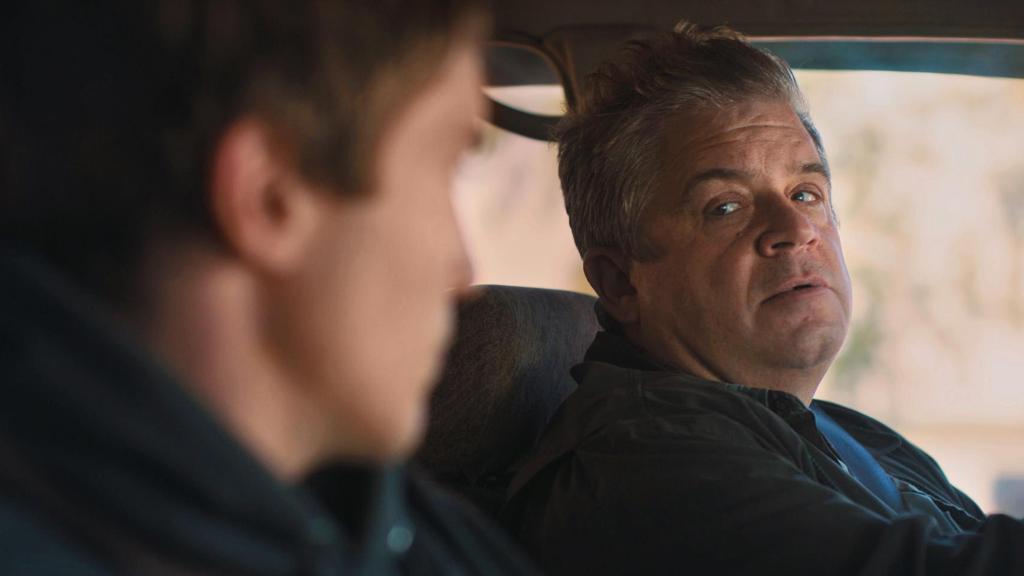
I Love My Dad
“The following actually happened. My father asked me to tell you it didn’t.” These are the first disarming words in James Morosini’s new comedy, I Love My Dad. And given that the film is about a father catfishing his adult son into believing he’s a beautiful young woman on Facebook, you can see why the real father feels this way. So it’s a credit to his son that the potentially horrifying premise is turned into such a warmly affectionate and outright funny crowdpleaser.
Told as much from the perspective of a distant and lifelong absentee father as the son he’s deceiving, I Love My Dad follows Chuck (Patton Oswalt on-screen) as he slowly realizes his son Franklin (also Morosini) has cut him out of his life, blocking him on social media and refusing to answer his calls or texts. Desperate to reconnect like it’s the last verse of “Cat’s in the Cradle,” Chuck thus assumes the identity, complete with name and online photographs, of Becca (Claudia Sulewski), the waitress at the diner down the street. Sulewski is then asked to take on double duty as the online conversations between “Becca” and Franklin are literalized, with Becca becoming the dream girl shoulder to cry on for a lonely kid… and the outlet for Chuck to find out what’s ailing him.
Which is all fine and dandy until Franklin wants to meet. And maybe try sexting, complete with Morosini now being the comely face haunting Chuck’s dreams. It’s a wicked sendup that Morosini, in only his second feature length directorial effort, handles adroitly. The movie never loses sight of how potentially twisted its premise is and instead mines it constantly for a joke that somehow never gets tired and always finds a new way to twist the knife. Still, it’s the cast, particularly Oswalt, who grounds the premise with a sense of misguided good intentions, allowing the audience to chuckle as much as cringe we realize that the title has a third entendre: It’s a genuine love letter to a caring, if boneheaded, father.
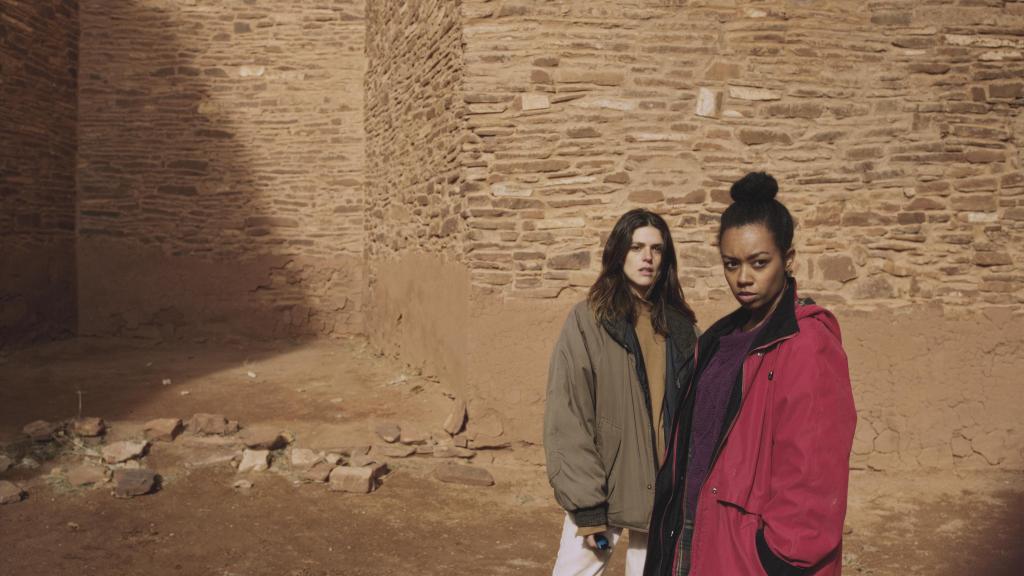
Jethica
At barely 70 minutes in length, Pete Oh’s Jethica is one of the more pleasant yet hard to categorize surprises to come out of this year’s festival. Technically, the movie is a ghost story. One in which Elena (Callie Hernandez) offers old acquaintance Jessica (Ashley Denise Robinson) an unusual solution to her stalking problem: sic a spirit on the creeper.
But the appeal of the film has a lot less to do with plot than it does with its acerbic meditation on broken souls and dead-end roads. This is perhaps most strongly articulated by its cast, led by Hernandez, who is also one of three credited screenwriters on the project. Perhaps best known for supporting work in movies as wide ranging as The Endless and La La Land, Hernandez makes a compellingly sardonic lead, whose cynicism complements Robinson’s exhausted and clear-eyed determination to be free of stalker, a self-described “nice guy” named Kevin (Will Madden).
The sharpness of the screenplay, which also includes Andy Faulkner and Madden to its credits, is partially derived from the fact that it takes the time to understand and even pity Kevin while nevertheless considering the full breadth of his withering horror and obsessions. That along with the way the narrative reaches for Twilight Zone-esque solutions for its real world horrors helps set Jethica apart. Sleek, to the point, and ultimately rewarding, this is a singular viewing experience worth seeking out.
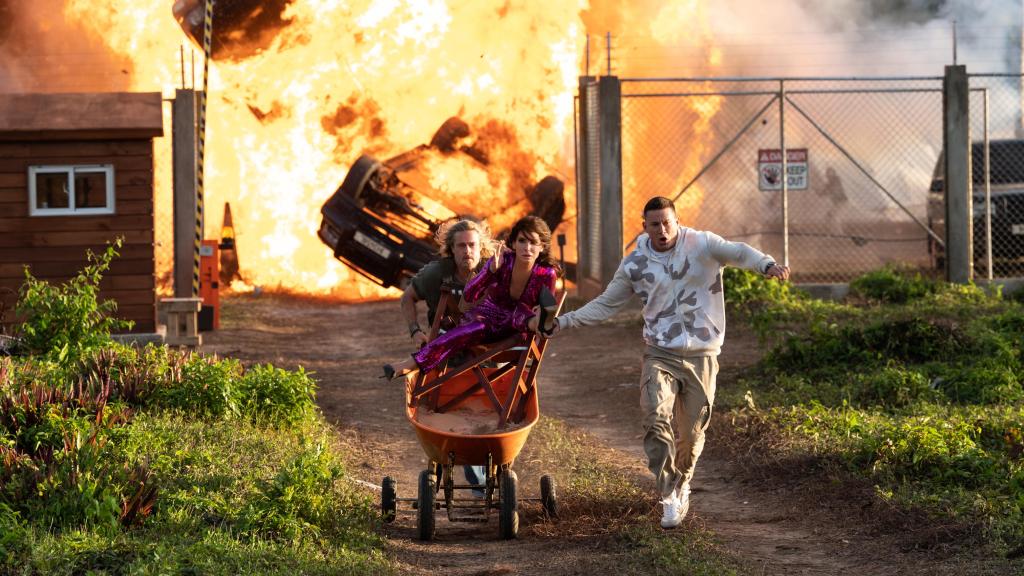
The Lost City
Even at a glance, it’s clear The Lost City owes more than a bit to Romancing the Stone. After all, the logline is that a romance novelist (Sandra Bullock this time) gets lost in the jungle and a big strong he-man comes to rescue her. But beyond the amusing wrinkle that novelist Loretta Sage’s “hero” is actually her bumbling cover model, Alan (Channing Tatum), and the realization that neither of them are particularly good at surviving in the jungle, what makes The Lost City sing is its greater nostalgia for a larger bygone age of Hollywood moviemaking: a time when crowdpleasers starred actors playing adults in actual locations with an earnest sense of adventure, instead of glib capes in front of blue screens intended to be filled in with explosions later.
Indeed, The Lost City pivots on that transformation from a glossy (and initially uneven) modern comedy in its early scenes to an increasingly retro adventure that would’ve been a dime a dozen at the multiplex in the ‘80s and ‘90s. There is the romantic element between Loretta and Alan, of course, but also a dawning realization by both the characters and the film that it’s more fun to be lost in wonder than cracking wise. Not that there isn’t a lot of humor to be enjoyed in the film’s best set pieces, particularly those that were unfortunately spoiled by the trailers. Yes, Brad Pitt’s extended cameo as Jack, the true jungle he-man worthy of Loretta’s novels, is every bit as delightful as you would hope. Daniel Radcliffe also appears to be having a ball at playing a faintly Murdochian supervillain who kidnapped Loretta to find a lost treasure.
It’s lightweight, but a welcome respite from the drudgery of multiplex modernity.
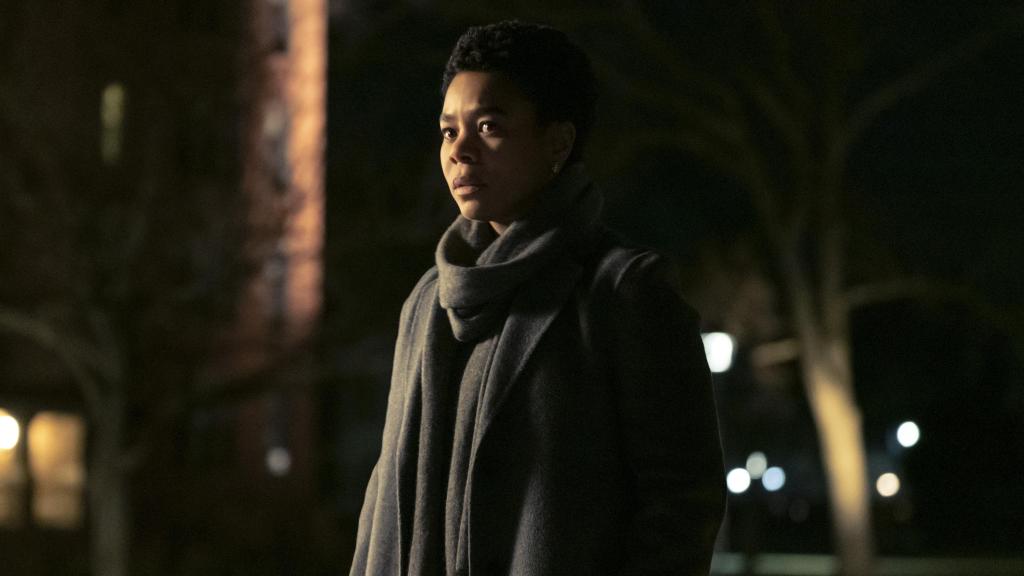
Master
Institutions have a tendency to deify their history. The longer the legacy, the more glorious the myth. Yet the effect of those legends, and how hostile they can be toward those not part of an official story, can be insidious. And it’s in these oppressive shadows that writer-director Mariama Diallo finds the stuff of potent allegorical horror in her feature debut, Master.
The dual story of an Ivy League school freshman Jasmine (Zoe Renee) and her dormitory’s new “master” professor Gail (Regina Hall), Master takes a hard critical gaze at the unspoken, but often quite conscious, biases in academia. Gail and Jasmine are both Black women, and one has learned to operate in the vastly white world of elite higher education while the other isn’t even aware of how severe the board is set against her. But both find themselves on unsure footing as they learn of the dorm’s own grim history for Black students—and the greater forces at work against them which seem to have manifested into the supernatural.
Dealing with complex issues regarding racism, institutional biases, and the paranoia that comes with tokenism, Master is powerful and unsettling work whenever it spends time developing its chilly rarified world, watching both students and professors interact with their peers. The actual “horror” elements are a bit more heavy-handed and lack the bite of scenes sitting in the faculty lounge, but cumulatively they reveal Diallo as a major talent to watch rise… and a movie that can cut to the deep by articulating the slights and bigotries that often go unsaid.

Pretty Problems
Kestrel Pantera’s Pretty Problems is a concept we’ve seen done quite a few times recently. And the biggest problem for the new indie is it was done a lot better in last year’s hit HBO series, The White Lotus. Still, chronicling the indulgences of the uber rich, and the havoc (both economic and psychological) that wreaks on all other castes in American life should always be fertile narrative ground. And Pretty Problems begins promising enough when Lindsay (Britt Rentschler) and Jack (Michael Tennant) find themselves seduced by Lindsay’s unlikely new friend Cat Flax (J.J. Nolan). Despite both heroes being down on their luck, with Lindsay working at a salon and Jack as a traveling salesman, they are happily invited to spend the weekend at a spa in Californian wine country where it’s only trendy to buy wine by the case.
There are the prerequisite moments of Cat’s husband Matt (Graham Outerbridge) and his obnoxious former frat boy friends sniffing out Jack doesn’t have money, and Lindsay being offered the tantalizing promise that maybe her rich friend will soon invest in her. Yet the trouble lies in that both the allure of the elite’s luxurious world and the Faustian temptation it presents appears as empty and superficial as all the characters in the film. And that means all. Cat and Matt are of course paperthin caricatures of vapid indulgence and selfishness, but neither Lindsay or Jack amount to much more than easy marks drifting through a Napa Valley weekend waiting to be tested and fail. Neither couple is worth spending an evening with, even one as fleet as the movie’s 103 minutes.
The film lacks either the texture or the scale to do much more beyond stating the obvious regarding its characters’ ravenous greed. But there are stronger vintages to be had of those justifiably sour grapes.
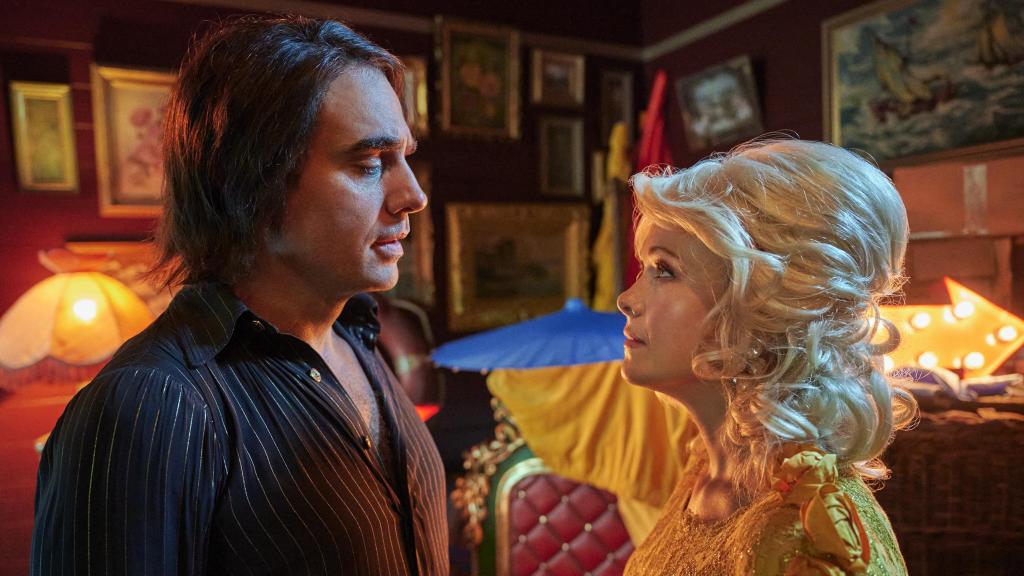
Seriously Red
Veteran character actress Krew Boylan reveals herself to be a compelling screenwriter in this sweetly bizarre dive into the mysterious world of celebrity impersonators. It’s already earned a lot of notice in the press for Rose Byrne, who’s also an executive producer on the project, appearing nigh unrecognizable in the movie as an Elvis Presley impersonator—and she really is almost impossible to spot as the gyrating “EP,” master of ceremonies in Australia’s apparently thriving impersonator subculture. But it’s Boylan’s movie as the eponymous “Red” which drives the narrative to unexpectedly tender and bitter moments.
With dreams in her eyes of becoming the best Dolly Parton impersonator Down Under, it is perhaps telling that Red is a genuine redhead who wants to transform herself into a blonde. And yet, there is a unique strength and vitality which Boylan’s heroine achieves whenever she attempts the Tennessean drawl and laments that damnable “Jolene.”
Gracie Otto’s affectionate direction neither judges or fully celebrates this apparently vast underworld in which the best impersonators are flown all around the globe (they’re apparently a popular attraction in Hong Kong) to imitate, mimic, and echo the voices of singers who might be generations gone. Yet with its candy colored set direction and crisp screenplay, it never loses sight of its central conceit about a woman who is both trying to raise and hide from herself. It also features Byrne’s Presley impersonator descend into old, sad Elvis, which is both even funnier and surprisingly more touching than it sounds.

Sheryl
Sheryl Crow came to fame at a peculiar moment in pop culture. Breaking out in 1993 with “All I Want” off her debut album, Tuesday Night Music Club, Crow skyrocketed to pop and rock superstardom in the last era before social media and smartphones made musical artists as ubiquitous in fans’ everyday lives as a weather app. There was still a mystique to being a musical artist, which Amy Scott’s new documentary for Showtime, Sheryl, happily wallows in.
With in-depth interviews with Crow and a legion of her colleagues, friends, and contemporaries, Scott (who also helmed the blissful Hal Ashby doc, Hal) explores many avenues of Crow’s career, as well as some of her own personal battles with depression, cancer, and, quite strikingly, sexism. The doc begins with the type of loaded questions that were aimed at female celebrities in the ‘90s, particularly those who tried to control their own careers by becoming producers (in which Crow was a trailblazer), and goes on to track the continued artifice of the entertainment business then and now. But the wealth of home movies and footage that pulls back the curtain on that era, and which have never been seen before, is what gives Sheryl an intimate, conversational charm, even if it is often just as happy to play the hits.
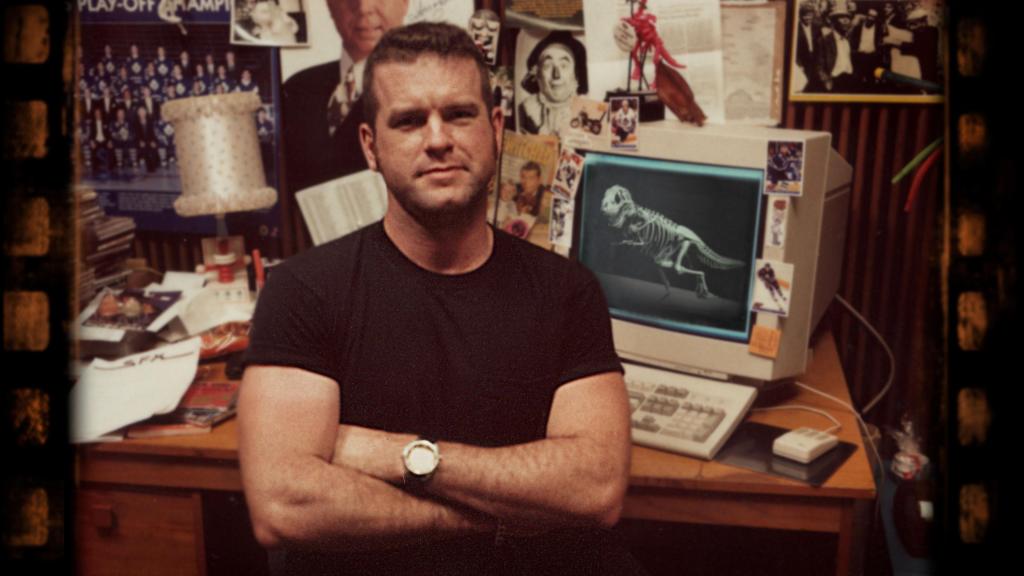
Spaz
Steve “Spaz” Williams is responsible for the CGI dinosaurs in Jurassic Park. Which is to say that, in his own way, Spaz is responsible for the modern digital effects world of blockbusters. Yet until fairly recently this was not common knowledge, even among movie nerds. And that is enough to make director Scott Leberecht’s Spaz documentary a welcome insight into the fast and heady days of 1980s and ‘90s moviemaking, particularly in the realm of digital effects’ bleeding edge.
Leberecht achieves more than just documenting Williams’ accomplishments, however. A special effects man himself, Leberecht provides an insider’s understanding of the rivalries, egos, and politics of this industry, while also having the good sense of knowing his subject well enough to step back and let Williams tell his story, blemishes and all, in his own words. With a rough, laconic disposition and a gaze that can be obliterating, Williams is as asymmetric to his “Spaz” name as “little” would be to describe Shaquille O’Neal. Williams is an artist—very much to a fault—with the energy of a roughrider. But that sense of perfectionism provides Leberecht with a documentarian subject who can be unsparing, even when describing the faults of his own life.
Spaz provides overdue recognition for one of the most pivotal talents in the recent history of cinema, and also essays how undaunted that talent could be, even when it was headed toward a wall.
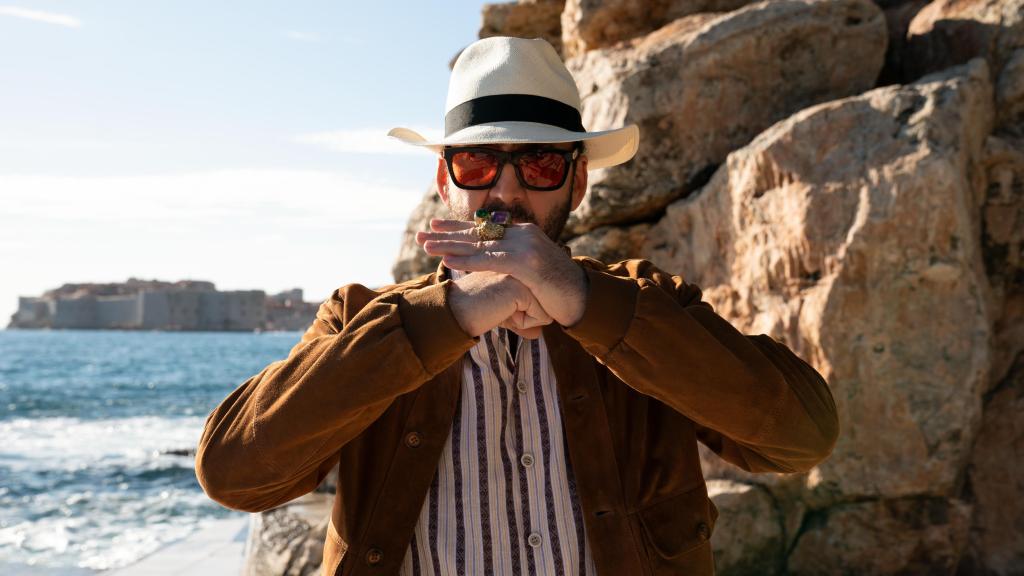
The Unbearable Weight of Massive Talent
The energetic actor, movie star, and meme muse is coming off one of the most lauded performances of his career in Michael Sarnoski’s Pig. He’s by all appearances a healthy and thriving 58-year-old man with nothing but sunny days to look forward to. And yet, his latest and most distinctly Cage-ian film, The Unbearable Weight of Massive Talent, operates as a sort of midpoint career eulogy.
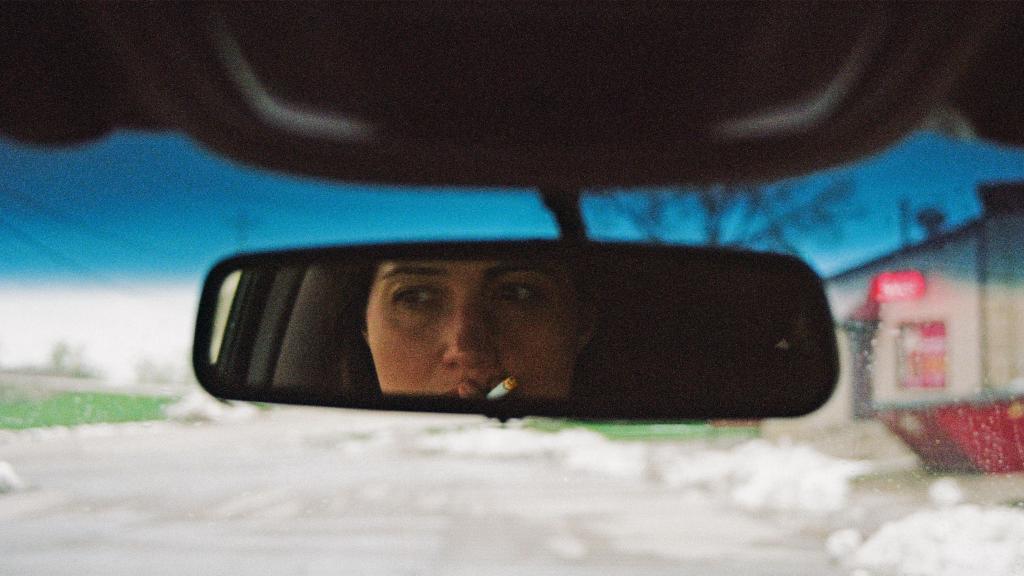
The Unknown Country
One of the best things about the vastness of this country is the ability to get lost in it. To take off on the road and drive for days—forever, if you really wanted—and never see the same place twice. But for Lily Gladstone’s Tana in The Unknown Country, her roots to the countryside go deeper than the asphalt, and the reason she needs to escape is never quite fully stated, even if it is unequivocally felt. A Native American woman who’s been asked to reunite with her estranged Oglala Lakota family, Tana is in a grief as all consuming as the landscape outside her window, and in her national moment.
This is due to the fact writer-director Morrisa Maltz made the canny choice to turn The Unknown Country into as much a documentary as a narrative drama. Gladstone is portraying a character, but most of the folks she interacts with are not actors (at least before cameras rolled). They’re real people in a real world, which colors the specific moment when the film was shot before COVID but after discrimination against indigenous people, and really all non-white people, was on the rise following the 2016 presidential election. And Tana is journeying into this world alone as a woman—but also someone seeking freedom.
Consequently, The Unknown Country takes on a dreamy surrealist quality as it meshes the reality of everyday life with the interiority of Tana’s own melancholy, finding fertile humanity on both sides of this paradigm. Tana doesn’t exactly know where she’s going—she considers “Mt. Rushmore,” “Devils Tower,” and several other locations rechristened by colonizing forces centuries ago, but which have a history far older than the U.S. government—but the journey there is ultimately transcendent and intoxicating.

X
Porn. The ‘70s. A Texas summer night massacre. There are so many salacious buzzwords you can apply to Ti West’s horror return that all there appears to be missing is a chainsaw. But for whatever frothy vivaciousness it brings, what’s most striking about the simply titled X is that it’s no frolic. The A24 movie about sex workers and porn stars has a melancholic soul and, at least for half of its running time, concerns itself with matters above the belt.
TELEVISION
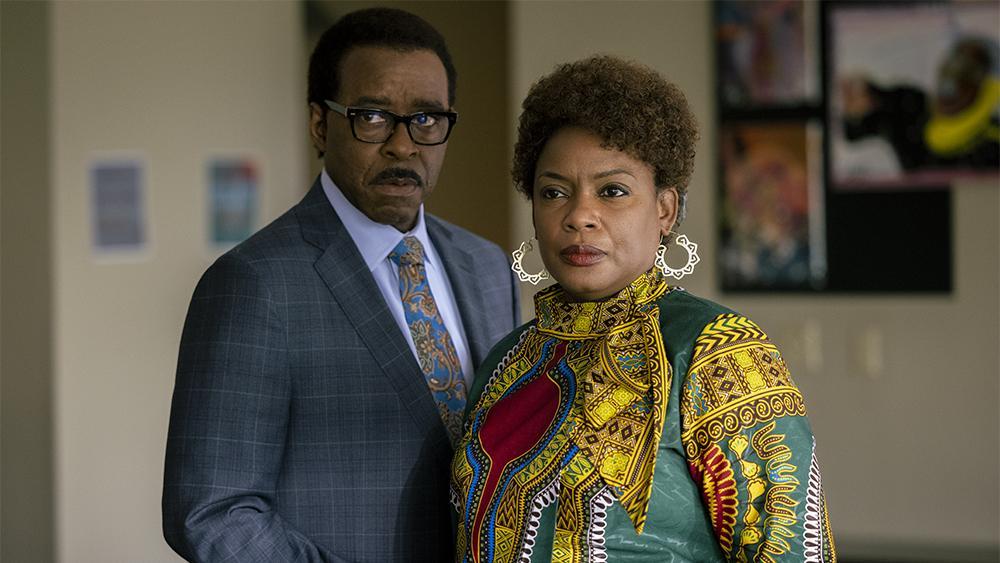
61st Street
61st Street is about running – both towards something and away from it. Moses Johnson (played by Doctor Who’s Tosin Cole) got out of his rough South Side Chicago neighborhood with a track scholarship to college. But when Moses gets wrapped up in an unfortunate situation involving a local cop, he has nowhere to run.
61st Street, which is premiering on AMC, AMC+, and ALLBLK this April, comes from prolific British TV crime chronicler Peter Moffat. After wetting his beak in the American legal system with Showtime’s Your Honor, Moffat is diving deep into the corrupt Chicago criminal justice system. Thankfully, he has Courtney B. Vance as beleaguered attorney Franklin Roberts to help him on the journey.
The first episode of 61st Street premieres April 10 on AMC.
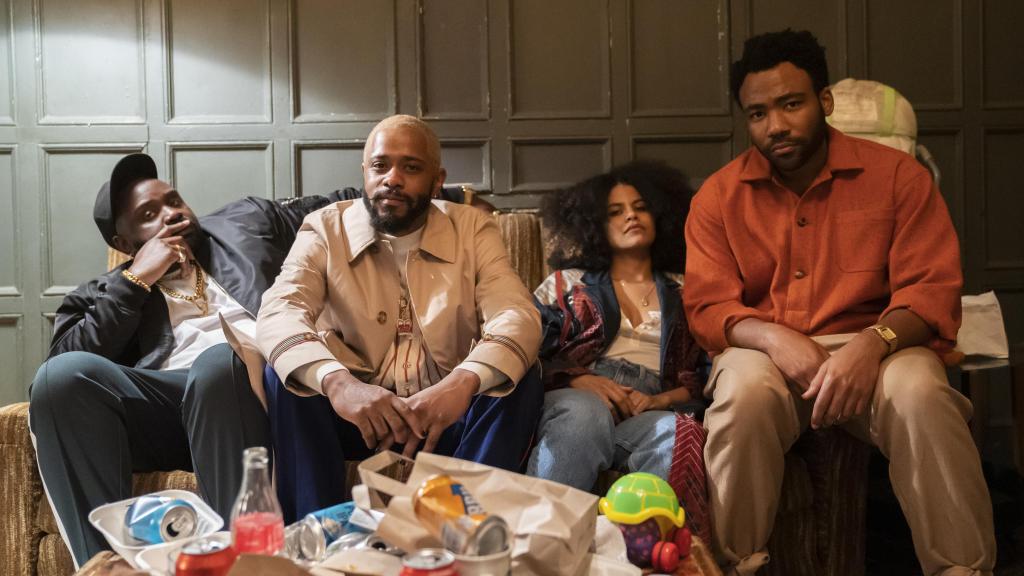
Atlanta
It’s been far too long since FX comedy Atlanta graced the airwaves. But that’s just to be expected when the show’s creator and star has a second, third, and fourth gigs as a Grammy-winning music artist, an accomplished blockbuster film actor, and a bravura filmmaker. Yes, Donald Glover is a busy guy. His schedule, combined with the COVID-19 pandemic meant that Atlanta took four years to make its way back to television for season 3. Based on the first two episodes screened at SXSW, however, it’s more than worth the wait.
In a sprawling conversation with Den of Geek, Glover revealed that the lesson he took from Atlanta (which just wrapped filming on its fourth and final season) is that “you do punk things, you get punk results.” Those punk results are very apparent in the early episodes of season 3. The first episode opens up with an astonishing and creepy prologue before moving on to an equally astonishing and creepy side quest of a story. By episode two, the season’s main plot of Earn (Glover), Paper Boi (Brian Tyree Henry), Darius (Lakeith Stanfield), and Van (Zazie Beetz) comes into clearer focus. It turns out that in order to fully understand both Atlanta and Atlanta, you have to leave them.
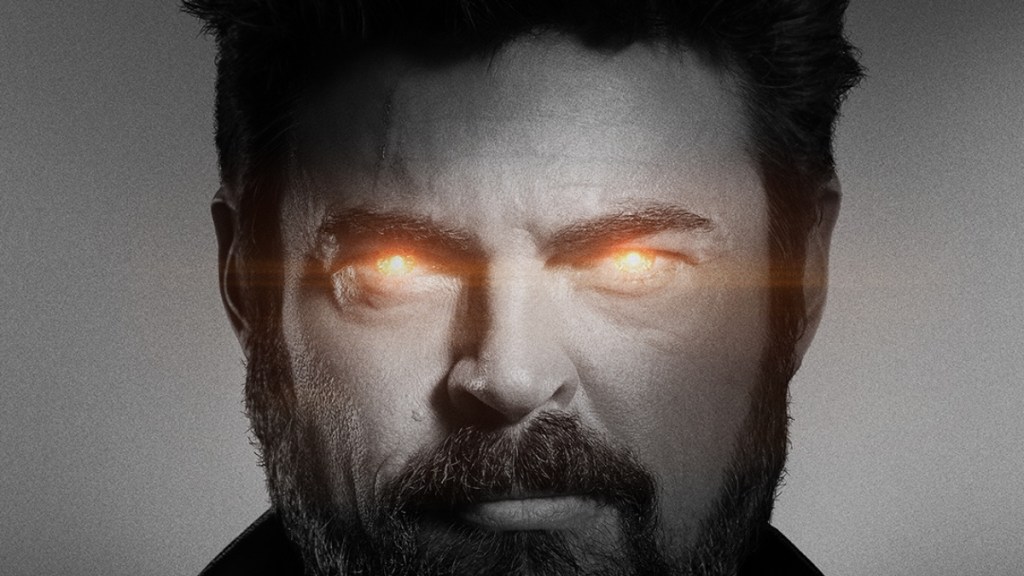
The Boys
Though Prime Video’s The Boys last signed off from its second season in October 2020, in many ways it’s felt like the dark superhero satire hasn’t taken a break at all. Not only has Amazon kept the adaptation of Garth Ennis and Darick Robertson’s comic alive through an ingenious immersive marketing campaign featuring dispatches from the Vought News Network, but reality itself seems to be doing a fine impression of the show all on its own.
The Boys imagines a deeply dysfunctional world in which shady politicians, cultish churches, and an omniscient corporation all conspire to keep the American public fed with the superhero content they crave. Now, thanks to a revealing trailer released at SXSW, we know that season 3 is set to continue to fill out that world in meaningful ways.
Hughie will try to change things from inside the system by joining the staff of idealistic congresswoman (and secret supe) Victoria Neuman (Claudia Doumit). Jensen Ackles (of Boys showrunner Eric Kripke’s previous TV phenomenon, Supernatural) joins the cast as a Captain America-esque blast from the past known as Soldier Boy. And through it all Billy Butcher (Karl Urban) and Homelander (Antony Starr) will continue their super-powered cat and mouse game…this time, however, with a son in-between them.
The Boys season 3 will premiere June 3 on Amazon Prime Video.
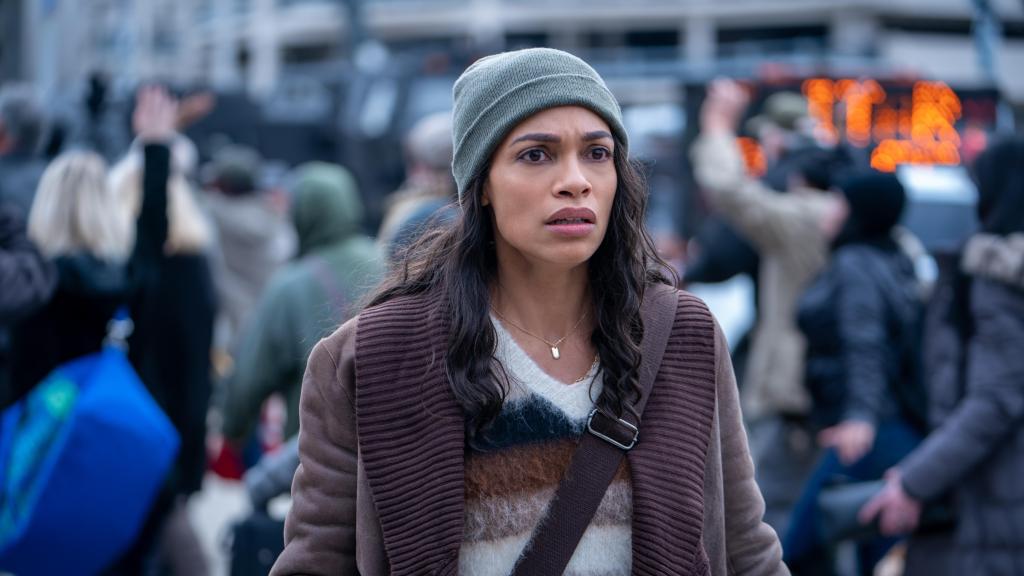
DMZ
In the current high-paced news landscape, it’s hard to premiere just about any socio-political TV series without it seeming accidentally timely. HBO Max’s DMZ in particular, however, would have felt up-to-the-minute just about whenever it arrived. This adaptation of a DC comic about a second American civil war would have seemed appropriately-timed if released shortly after the comic’s premiere in 2005 amid the War on Terror. It would have felt timely if it premiered last year in the wake of the January 6 insurrection in the U.S. Capitol. And it feels timely now as Russia invades Ukraine, creating gruesome imagery of destroyed cities and displaced or dead citizens.
Though DMZ can’t help but feel tied to this particular moment, this HBO Max series strives to capture something more permanent and elemental. The terminally underrated Rosario Dawson stars as NYC medic Alma Ortega. When a civil war between two warring American factions turns the island of Manhattan into a demilitarized zone (DMZ) no man’s land, she enters into the fray to find her lost son. Despite being filmed in Atlanta, DMZ’s depiction of a ravaged Manhattan is stunning to behold and its relatively brief four-episode runtime tells an efficient saga of family found and family lost.
All four episodes of DMZ are available to stream on HBO Max now.
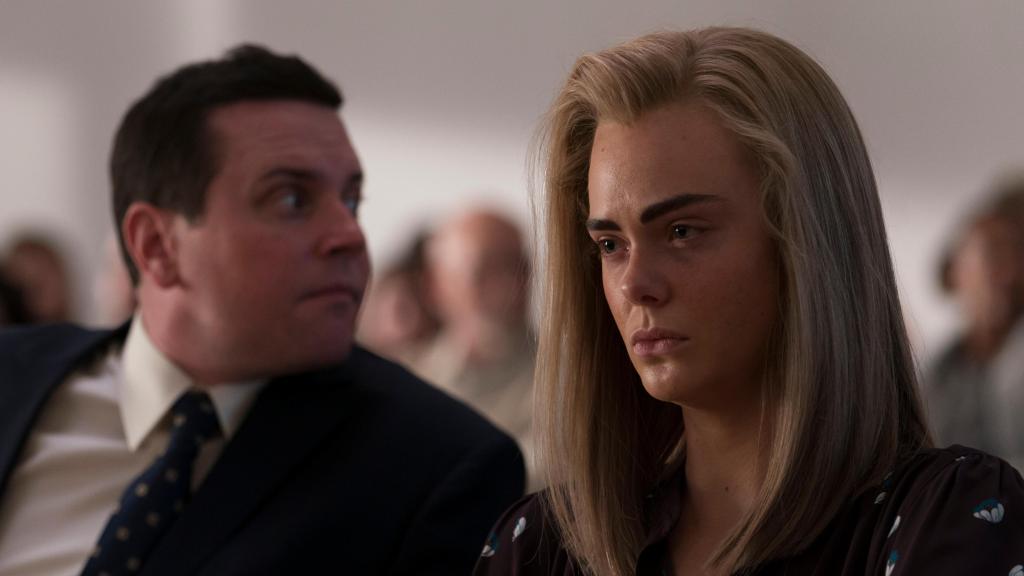
The Girl From Plainville
The Girl From Plainville is one of the two real life crime stories that Hulu is rolling the dice on this March. The first was The Dropout, a superb and thorough exploration of Elizabeth Holmes and the Theranos fraud scandal. The Girl From Plainville is the streamer’s second effort and a less successful one. But that’s not for lack of a fascinating story at the center.
Those unfamiliar with the story of Michelle Carter and her “suicide by texting” case will be absolutely floored by what The Girl From Plainville presents (after three ponderous opening episodes). This, more than just about any other modern court case, captures the surreal technological reality that Western teenagers face on a day-to-day basis. Other mediums have captured this particular saga better, but if you prefer a scripted drama version of it, this should get the job done.
The first three episodes of The Girl From Plainville premiere March 29 on Hulu.

Halo
Some TV shows have an easier developmental path than others. There’s no shame in that as behind-the-scenes chaos isn’t always a TV death sentence. In fact, “development hell” is a prominent enough concept to have its own Wikipedia entry. Paramount+’s video game adaptation Halo, however, has endured quite a special development hell. Let’s call it the ninth circle of development hell.
An adaptation of the Microsoft video game franchise was first plotted as a film in 2013 with Steven Spielberg attached to produce. Since then the project cycled through many iterations culminating with what would become a Showtime series in 2018. Now, two showrunners and a network change later, the final version of that series is finally set to premiere May 24 on Paramount+.
Pablo Schreiber (Orange is the New Black) steps into the bulky green MJOLNIR armor as John-117 a.k.a. Master Chief. This show is set in the same world as the series of video games and books fans have come to love but in a slightly different continuity. Familiar weapons, aliens, and even some tertiary human characters are all here but in a fresh package designed to help viewers identify with the usually anonymous Spartan super soldier.
Is Halo successful in that mission? Well…no. At least not at first But the show has a 10-episode first season order with a second season on the way to get its space legs.
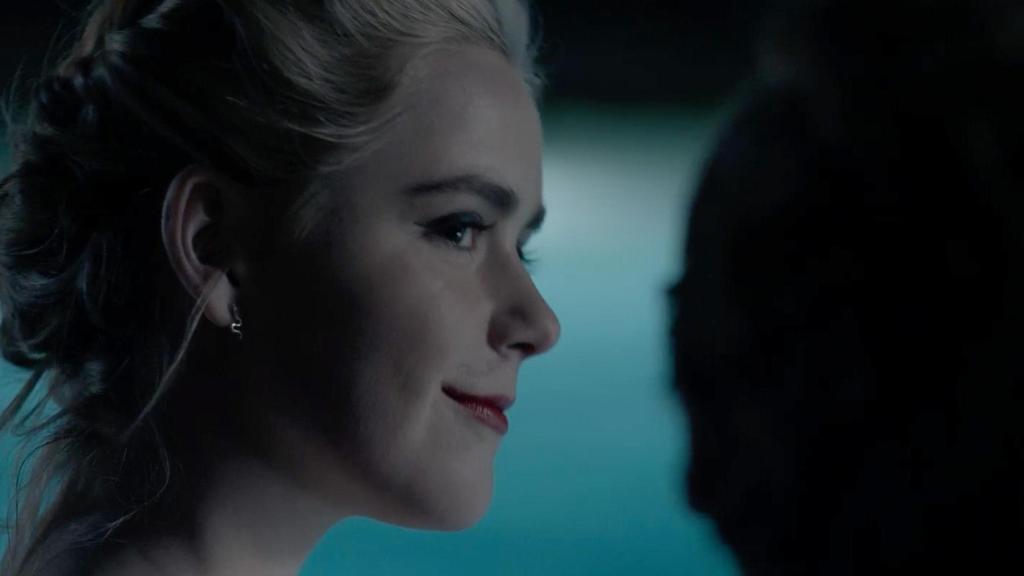
Swimming with Sharks
In the marketing material for Swimming with Sharks on The Roku Channel (formerly of Quibi…R.I.P.), showrunner Kathleen Robertson says that the show will ensure that “nobody will ever see Kiernan Shipka as ‘Don Draper’s daughter’ ever again.” Watching the shocking first episode of this sultry, sensual series immediately reveals that Robertson just might be right about the young Mad Men and Chilling Adventures of Sabrina actress.
Swimming with Sharks is a two-handed erotic thriller starring Diane Kruger as a successful film executive and Shipka as the young intern obsessed with her. The show borrows its title from a 1994 film of the same name, but little else. This is not only a fascinating career pivot for the erstwhile Sabrina Spellman, but a surprisingly solid debut for Roku as a TV player.

Upload
Greg Daniels is no stranger to crafting buzzworthy comedies. After writing for both Saturday Night Live and The Simpsons, Daniels went on to create The Office and co-create Parks and Recreation. Even with that impressive resume in mind, however, his Prime Video series Upload is a particularly ambitious undertaking.
The first season of this sci-fi/mystery/comedy mashup took place in a not-so-distant future when enormous tech company Horizon has created a digital afterlife for the rich and famous. After suffering a fatal car wreck, young tech developer Nathan Brown (Robbie Amell) is granted entry into the elite Lakeview due to his wealthy girlfriend’s connections.
Upload season 2, which premiered all episodes March 11 on Prime Video, continues the murder mystery with Nathan uncovering a political element to Horizon’s treachery. While the story is still compelling, it’s the comedy that shines through in this breezy second batch of episodes.
All seven episodes of Upload season 2 are available to stream on Prime Video now.
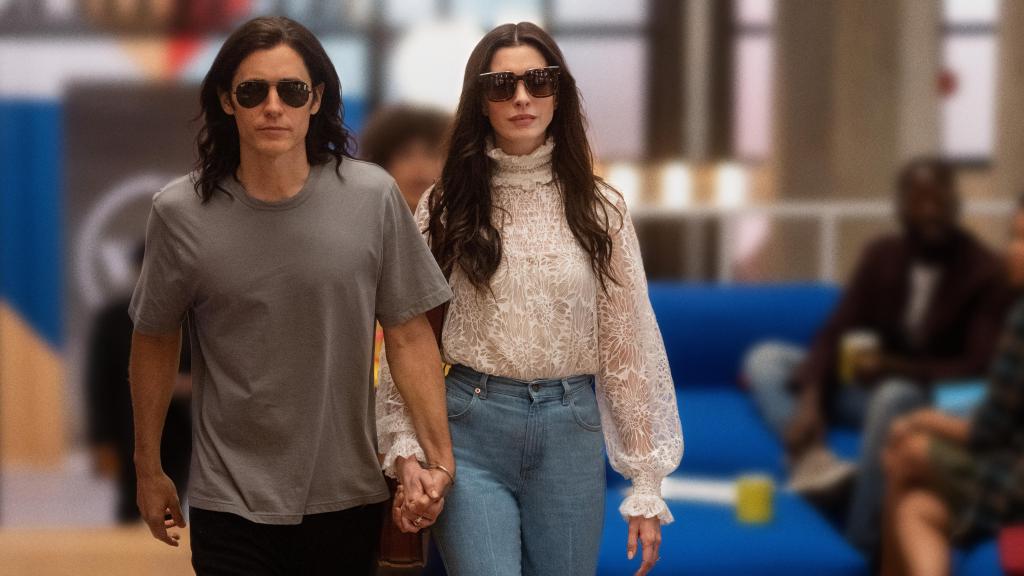
WeCrashed
For much of its early existence, Apple TV+’s M.O. has been simple: find big stories and even bigger stars to tell them. Limited series WeCrashed fits that bill perfectly. This show, based on a podcast of the same name, tells the real life story of tech upstart WeWork – both of its rise and even more precipitous fall.
Embodying the two leads, WeWork founder Adam Neumann and his wife Rebekah, are Jared Leto and Anne Hathaway. As an actor, Leto has never been known for, let’s say, holding back but he’s particularly on one here as the new age-y tech bro with a God complex. How one responds to Leto and Hathaway’s bombastic performances will probably inform how they feel about WeCrashed. In our opinion though, the nutty Leto is good Leto.
GAMES AND ACTIVATIONS

eMLS Cup
Twelve of the best EA SPORTS FIFA players in the world, each representing an MLS team, made their way to ACL Live in Downtown Austin to compete in the winner take all eMLS Cup. Fans were fired up to see the return of an in-person eSports event, filling ACL Live to the brim. Austin FC’s very own xVerde nearly pulled off a first round upset of New York Red Bulls’ Doolsta, which had the hometown crowd buzzing. A late goal by Doolsta put the Red Bulls on top, quieting the locals decked out in Austin FC’s green kits.
Witnessing the raw emotions and incredible skill of the players brings another level of appreciation for the show they put on. The event attracted more than 800,000 viewers on Twitch, which is an all-time high, with viewers spending 40% more time watching than in 2021. The excitement surrounding the 2022 eMLS Cup presents how eSports are beginning to compete with other major sporting events in terms of viewership.
Atlanta United’s Paolo Neto(PaoloNeto999) took home the trophy along with $35,000 in cash. Paolo Neto along with second place finisher, KingCJ0, and third place finisher, GoalMachine, will now move on to compete in the EA SPORTS FIFA Global Series Playoffs.
